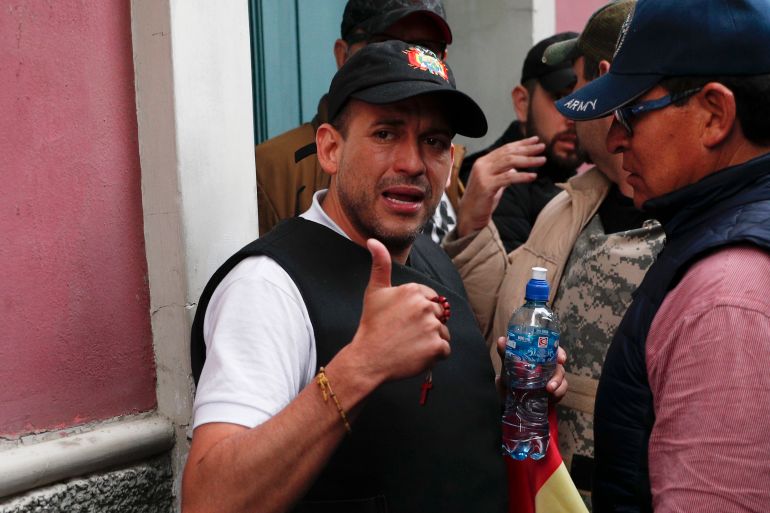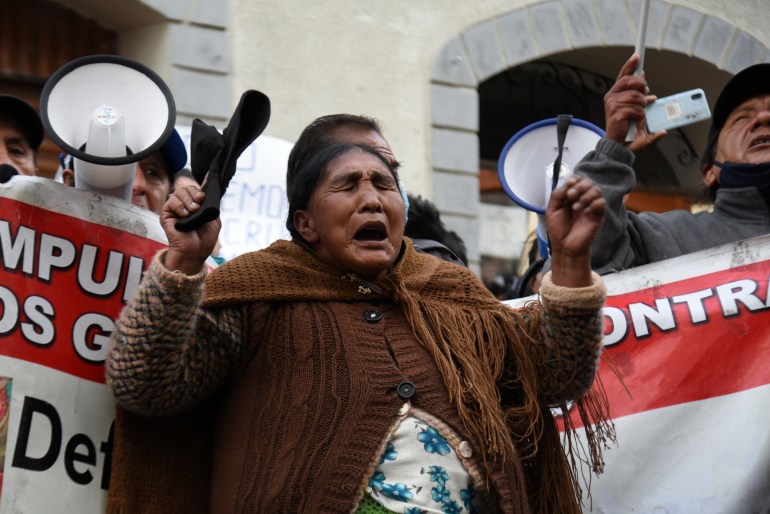Bolivian opposition leader held on ‘terrorism’ charges
Prosecutors seek six-month pre-trial detention for jailed right-wing Santa Cruz Governor Luis Fernando Camacho.

Prosecutors in Bolivia are seeking six months of pre-trial detention in the case of Luis Fernando Camacho, the governor of Santa Cruz and prominent right-wing leader whose sudden arrest on Wednesday sparked allegations of kidnapping.
Camacho is being held in the political capital of La Paz on charges of “terrorism”, prosecutor Omar Mejillones confirmed in a statement on Thursday.
Keep reading
list of 3 itemsICJ declines to issue decision in Chile-Bolivia river dispute
Bolivian police arrest prominent opposition leader
The Santa Cruz governor also faces ongoing investigations into his role during Bolivia’s 2019 political crisis, which led to the departure of then-President Evo Morales. Among the charges being considered are breach of duty, misuse of influence and attacking the president and high-ranking officials.
Camacho – a former presidential candidate who heads the powerful Christian conservative coalition Creemos – had been a leader during the 2019 protests that helped to remove Morales, the country’s first Indigenous president, from office.
In a statement, Camacho rejected the accusations, saying they lacked credibility.
The 2019 political crisis saw Morales seeking a fourth consecutive term as president, a move his critics denounced as unconstitutional. Morales had successfully appealed to the Supreme Court to abolish term limits after voters refused to do so in a 2016 referendum.
Morales successfully won his fourth term in October 2019 but the election was mired in allegations of fraud and protests erupted contesting Morales’s leadership. The Inter-American Commission on Human Rights estimates 36 people lost their lives in the crisis. With an international audit under way and violence in the streets, Bolivia’s military called on Morales to resign.
He did, leaving office in November 2019, but condemned the conflict as a “coup”. On Thursday, Morales applauded Camacho’s arrest with a post on Twitter.
“Finally, after three years, Luis Fernando Camacho will answer for the coup d’etat that led to robberies, persecutions, arrests and massacres of the de facto government. We trust that this decision will be upheld with the firmness demanded by the people’s clamour for justice,” Morales wrote.
Camacho’s allies, meanwhile, have called the arrest a “kidnapping”, organised by Morales’s Movement Towards Socialism (MAS) political party.
In a statement posted on Camacho’s social media on Thursday, his legal team said Bolivia’s judiciary had “practically closed the doors” against their legal actions to free the governor and was continuing to “violate [his] constitutional rights”.
Camacho’s arrest and subsequent jailing have heightened existing tensions between Bolivia’s left-wing government and conservative-led Santa Cruz, the largest of the country’s nine departments.
Following the prosecutor’s announcement on Thursday, the right-wing Pro-Santa Cruz Committee – a civic group of which Camacho was once president – announced it would lead a general strike on Friday as well as blockades on the department’s highways.
Already, protesters have taken to the streets in Santa Cruz to block roads. The local prosecutor’s office was reportedly set on fire. And on Wednesday, amid reports Camacho was being flown to La Paz to face charges, protesters entered two Santa Cruz airports in an apparent attempt to stop his transport.
Bolivia’s public works minister Edgar Montano took to Twitter on Thursday to say his house in Santa Cruz had been targeted and burned, “violating the integrity and safety of my family”. He blamed Camacho and the Pro-Santa Cruz Committee for the attack.
“They are not going to intimidate us with criminal acts such as burning my home and calls on social networks to loot institutions and homes belonging to other officials”, he tweeted, adding: “#SantaCruz is not an independent country.”

Earlier this year, the Pro-Santa Cruz Committee led widespread protests after current President Luis Arce, a member of Morales’s Movement Towards Socialism party, announced plans to postpone Bolivia’s census.
The census, originally scheduled for this year, was expected to show population growth in Santa Cruz, a soy-growing department rich in agriculture that also houses the country’s largest city. That, in turn, would have resulted in more government funding allocated to the department, as well as greater representation in Congress.
Prosecutors have promised to seek the “harshest punishment” for any violence stemming from this week’s protests. Meanwhile, Bolivian politicians representing Camacho’s Creemos party have called on the Inter-American Commission on Human Rights to protect Camacho’s “safety and integrity”.
A spokesperson for the United States State Department told Reuters: “We encourage observance of international norms and reliance on democratic institutions. We urge all parties to resolve this issue peacefully and democratically.”